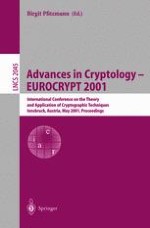2001 | OriginalPaper | Buchkapitel
On Adaptive vs. Non-adaptive Security of Multiparty Protocols
verfasst von : Ran Canetti, Ivan Damgaard, Stefan Dziembowski, Yuval Ishai, Tal Malkin
Erschienen in: Advances in Cryptology — EUROCRYPT 2001
Verlag: Springer Berlin Heidelberg
Enthalten in: Professional Book Archive
Aktivieren Sie unsere intelligente Suche, um passende Fachinhalte oder Patente zu finden.
Wählen Sie Textabschnitte aus um mit Künstlicher Intelligenz passenden Patente zu finden. powered by
Markieren Sie Textabschnitte, um KI-gestützt weitere passende Inhalte zu finden. powered by
Security analysis of multiparty cryptographic protocols distinguishes between two types of adversarialsettings: In the non-adaptive setting, the set of corrupted parties is chosen in advance, before the interaction begins. In the adaptive setting, the adversary chooses who to corrupt during the course of the computation. We study the relations between adaptive security (i.e., security in the adaptive setting) and non-adaptive security, according to two definitions and in several models of computation. While affirming some prevailing beliefs, we also obtain some unexpected results. Some highlights of our results are: - According to the definition of Dodis-Micali-Rogaway (which is set in the information-theoretic model), adaptive and non-adaptive security are equivalent. This holds for both honest-but-curious and Byzantine adversaries, and for any number of parties.- According to the definition of Canetti, for honest-but-curious adversaries, adaptive security is equivalent to non-adaptive security when the number of parties is logarithmic, and is strictly stronger than non-adaptive security when the number of parties is super-logarithmic. For Byzantine adversaries, adaptive security is strictly stronger than non-adaptive security, for any number of parties.
